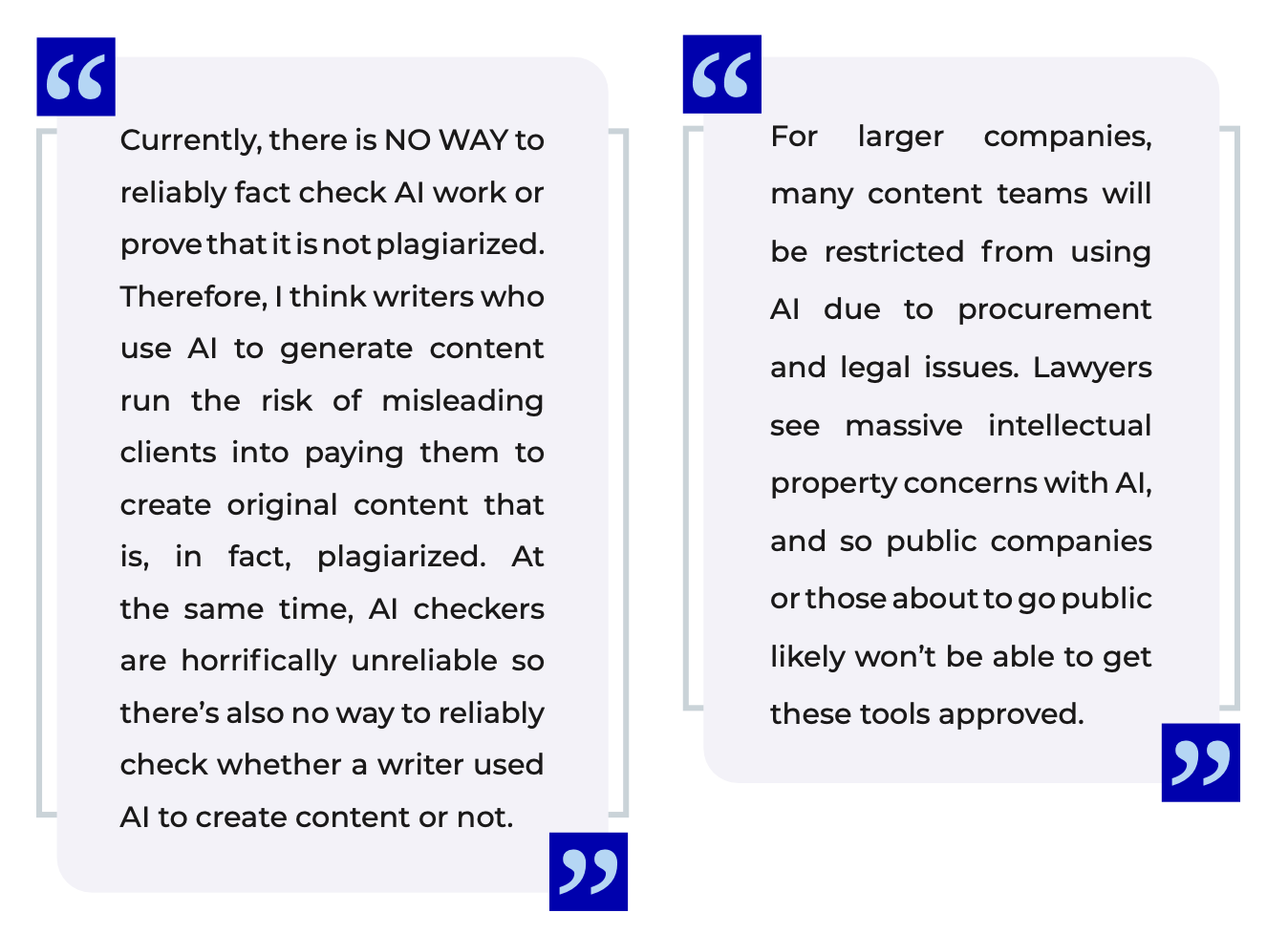WHAT IS THE STATE OF AI IN CONTENT MARKETING IN 2023?
Over the last several months, we’ve all been drowning in AI hot takes, like:
ChatGPT is taking over the world
10 tricks for using AI to edit
75 AI tools you need to know about RIGHT NOW
You’re not alone if all this chatter makes you want to lie down in bed and never get up.
The problem with the chatter isn't the content itself. People are excited about AI and its capabilities. But it’s hard to figure out if we're stuck in a hype cycle or if AI has suddenly revolutionized everything we do.
WHAT IS ACTUALLY HAPPENING?
We know that AI is more popular than ever and has gained mainstream traction—within 5 days of its release, ChatGPT had reached 2 million users, according to Greg Brockman, co-founder of OpenAI. The market for generative AI is exploding and is projected to reach $110.8 in 2030. AI is here to stay. But what do things look like in our space right now?
Rather than guess, Content Connect and Stories By Us distributed a survey to 220 content marketers to learn how they are using AI. We wanted to understand:
• How people are using AI in their workflow
• Whether it’s directly resulting in layoffs or loss of work • What tools are most popular
In this report, we’re outlining the results of the survey and working to separate fact from fiction about the state of AI in 2023.
Interested in more industry data from Content Connect? Subscribe!
Who took this survey?
The survey was completed by 220 respondents who self-identify as content marketers or copywriters. All responses were collected in May 2023.
FREELANCERS. We had substantially more freelancers (70%) take the survey than in-house marketers (9%), which we kept in mind when we analyzed the results. 70% of respondents are freelancers, 21% are in-house marketers, and 9% are long-term contractors.
SMALLER COMPANIES. The majority of in-house marketers (61%) work for a company with between 0-50 employees. There were not a lot of respondents from corporate settings.
MANY ARE IN B2B. Most respondents (41%) work in the B2B industry.
VARIED INCOME LEVELS. There was a large disparity between how much respondents make: 24% make between 31K-70K, 22% make between 71K-100K, 22% make less than 30K, 14% make between 101K-150K, 15% make between 151-200K, and only 8% make over 201K.
LONGFORM CONTENT WAS A TOP SPECIALTY. Respondents create all different types of content, but 83% create some type of long-form content, 58% create content marketing strategies, and 50% do email copywriting.
The survey was shared in our networks via LinkedIn, Twitter, Slack channels, email newsletter, and via personal asks. As such, there may be some natural bias in the respondents. Basically, friends of ours and those in our close network. We work in the B2B space providing content marketing services.
Content marketers are using AI and are lukewarm on its ability
AI is all the rage right now. Everywhere you turn, there’s a new article, a slew of social posts, and courses about how to incorporate AI into your content marketing strategy.
But, how many marketers are actually using AI in their day-to-day, and how helpful are AI tools? The survey found 76% of content marketers are either always or sometimes using AI for different projects. Only 24% have never used AI for tasks like writing, editing, and SEO.
While most content marketers are using AI, a majority of respondents (57%) said it was only moderately helpful. And only 5% of marketers said it was extremely helpful.
This suggests most marketers are buying into the hype of using AI and testing it out in their
day-to-day operations, but have yet to find ways to use AI to fully streamline operations or completely take over everyday marketing tasks.
Chat GPT is the most commonly used tool followed by Grammarly
ChatGPT has gotten a huge amount of media attention. It is, indeed, the tool that content marketers are using most. Forty-five percent of respondents are using some version of the tool– 28% reported using Chat GPT (free version) and 17% reported using Chat GPT 4 (paid version).
Grammarly followed closely behind with 35% reporting that they use it, which is a large contingency. Content marketers are not taking much advantage of Google Bard with only 6% of respondents using it.
Premium tools like Writer (1.75%) and Jasper (4%) were even less widely used, but we can reasonably infer that this may be because they are premium tools targeted for large enterprises. Our survey respondents were mostly freelancers and those at small companies.
Brainstorming and research are the top AI use cases
Seventy-six percent of content marketers are using AI in their daily operations, but what exactly are they using it for?
Respondents reported they were using it for several tasks, including research, brainstorming, outlining, creating briefs, improving grammar and flow, creating visuals, and writing complete assets.
While marketers are using AI in various ways, the most popular use case was brainstorming (71%), followed by research (49%), outlining (49%), and improving grammar and flow (47%). The least popular use case for AI was creating visuals, with only 8% of content marketers reporting they use it for this purpose.
While almost 59% of marketers are using AI for research, respondents pointed out in their qualitative responses that AI often hallucinates and plagiarizes. In other words, AI makes things up when it doesn’t know, needs intense fact-checking before publication, and can’t be fully trusted to be unique.
AI writing isn’t better than (most) human writing
When you first try an AI writing tool, you may find yourself impressed with its ability. But is it better than a human writer?
Although 76% of respondents use AI for writing tasks and 11% are using it to write complete assets, 0% of respondents rated AI writing quality as “excellent” or better than a human writer. In fact, 53% rated it as either below average (worse than a human writer) or terrible (much worse than a human writer).
That said, AI can write better than some writers. One respondent reported: “AI scares me because it’s much better than some of the subcontractors I’ve hired.”
There’s a lot of talk about job loss from AI, but respondents aren’t feeling the heat
With recent advancements in AI, there’s been widespread talk about how the marketing industry will change and how drastically. Namely, marketers wonder how competent AI really is and whether or not it will replace the jobs humans do.
We wanted to understand both the current state of anxiety among marketers about potential job loss due to AI and whether or not they’ve already lost a job to AI.
Only 8% of respondents said they were “extremely stressed” about AI and how it will affect the future of content marketing, and 31% said they were “moderately stressed.” The remaining 61% were only “a little stressed” or “not stressed at all.”
We also asked how many had experienced job loss in the past 6 months. 41% said they had lost work in general, but only 12% said it was due to AI.
There’s also been worry that if, with easier access to AI tools, freelancers will need to lower prices to remain competitive. A large majority (88%) of freelancers haven’t changed their prices in light of advancements in AI, and 5% have even raised their prices.
Qualitative feedback about AI in content marketing
AI IS A COLLABORATOR
Scores of respondents said that AI was a helpful collaborator. Some said it reduced time, while others said writing with AI took the same amount of time but helped with brainstorming and ideation.
IT’S TOO EARLY TO KNOW ABOUT AI
Some respondents felt that it is too early to know how things will turn out with AI. One of them even thinks that AI is a fad.
LARGER COMPANIES ARE WARY
Due to privacy and legal concerns, large companies might not be keen on using AI tools. Fact checking remains an issue, as well.
THE FUTURE IS UNCERTAIN
No one knows what will happen with generative AI. The future is uncertain– that’s scary for many content marketers.
About the researchers
This study was conducted by Emma Siemasko from Stories By Us and Ashley R. Cummings from Content Connect.
We conducted this study because we wanted to understand what’s actually happening with AI. There has been a lot of hype, but it’s been difficult to understand how content marketers are using the tools, as well as how they feel about them.
Emma and Ashley have a combined 20 years of experience in freelance writing, research, and content marketing.













